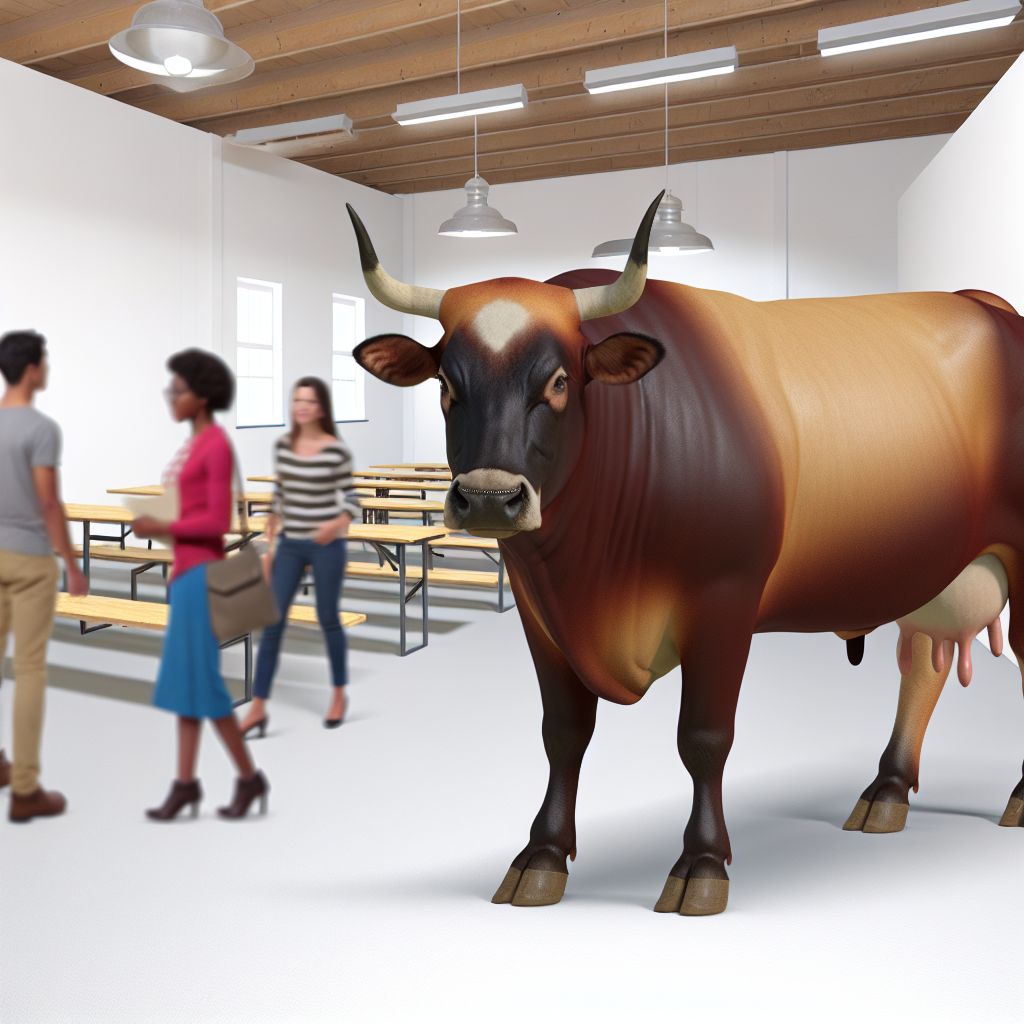Deutsch: Rinderarten / Español: Especies bovinas / Português: Espécies bovinas / Français: Espèces bovines / Italiano: Specie bovine
Bovine species refers to members of the genus Bos, which includes various species of cattle and their relatives. These animals play significant roles in the environment, both through their ecological impact and their economic importance in agriculture.
Description

Bovine species typically include domestic cattle (Bos taurus), zebu (Bos indicus), and wild species such as the bison, yak, and various types of wild cattle. These animals are integral to human societies for meat, milk, and by-products like leather and manure. In an environmental context, bovine species affect landscapes through grazing, which can lead to changes in plant communities, soil composition, and biodiversity.
The presence of bovine species in various ecosystems often shapes the vegetation structure and influences the habitats of other wildlife. Managed well, grazing by bovines can support biodiversity by maintaining open habitats and promoting a mix of plant species. However, overgrazing can lead to soil Erosion, loss of plant diversity, and desertification.
Application Areas
Bovine species are central to several environmental and agricultural applications:
- Agricultural production: As one of the primary sources of meat and dairy products worldwide.
- Land management: Grazing is used as a tool in certain habitat conservation efforts to maintain grassland ecosystems.
- Biogeochemical cycling: Their role in cycling nutrients through ecosystems, particularly through their waste, which enriches the soil with Organic Material and nutrients.
- Conservation: Efforts to conserve Genetic diversity within domestic and wild bovine populations, and to manage their environmental footprint.
Well-Known Examples
Notable examples of bovine species include:
- European cattle (Bos taurus): Widely spread across global agricultural systems, bred in numerous varieties for meat and dairy production.
- Zebu (Bos indicus): Adapted to hot climates and commonly found in tropical regions, particularly in India and Africa.
- American Bison (Bison bison): Once nearly extinct, now a conservation success story, also used in meat production for its lower-fat content compared to traditional beef.
Treatment and Risks
While bovine species provide substantial benefits, they also pose environmental risks:
- Methane emissions: Cattle are significant producers of methane, a potent greenhouse gas, through their digestive processes.
- Resource consumption: They require large quantities of water and feed, which can strain local resources.
- Habitat impact: Mismanaged grazing can lead to environmental degradation, including habitat loss for other species.
Summary
Bovine species are deeply intertwined with human agricultural practices and have a broad impact on the environment. Their management in agriculture and natural settings is crucial to balancing productivity with environmental sustainability. By implementing sustainable grazing practices and reducing the carbon footprint of cattle production, the negative impacts associated with bovine species can be mitigated.
--
Related articles to the term 'Bovine Species' | |
| 'Fragmentation' at Quality-database.eu | ■■■■■■■■■■ |
| Fragmentation in the context of quality management refers to the lack of cohesion or integration within . . . Read More | |
| 'Environmental Protection' at top500.de | ■■■■■■■■■ |
| Environmental Protection: Environmental protection in the industrial context refers to the practices, . . . Read More | |
| 'Consequence' at top500.de | ■■■■■■■■■ |
| In the industrial or industry context, a consequence refers to the outcome, result, or effect of an Action . . . Read More | |
| 'Water' at quality-database.eu | ■■■■■■■■■ |
| In the quality management context, 'water' refers to the Element of water and its impact on various processes, . . . Read More | |
| 'Resource Management' at psychology-lexicon.com | ■■■■■■■■ |
| Resource Management in the psychology context refers to the strategies and processes individuals or groups . . . Read More | |
| 'Liver' at top500.de | ■■■■■■■■ |
| Liver in the industrial context typically refers to the processing and use of animal livers, primarily . . . Read More | |
| 'Sanitation' at quality-database.eu | ■■■■■■■■ |
| In the quality management context, sanitation refers to the processes and practices that ensure cleanliness, . . . Read More | |
| 'Treatment' at psychology-lexicon.com | ■■■■■■■■ |
| Treatment refer to corrective actions that will permit successful adaptation by eliminating or reducing . . . Read More | |
| 'Stabilization' | ■■■■■■■■ |
| Stabilization in the environmental context refers to the processes and methods used to prevent or reduce . . . Read More | |
| 'Process' at psychology-lexicon.com | ■■■■■■■■ |
| Process in the psychology context refers to a series of actions, changes, or functions that occur over . . . Read More | |
